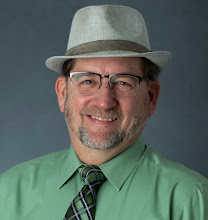Fearlessness sounds very appealing, although I don't believe I have ever experienced it, at least not in its purest form.
It seems that in every thing I do, regardless of the degree of confidence and competence earned from training and experience, there is nevertheless a noticeable measure of fear mixed in. Every task, even the mundane and routine, carries with it an implicit possibility of failure -- not necessarily a paralyzing apprehension of catastrophe, but more usually an annoying awareness of the persistent potential for disappointment, an irritating capacity for inconvenience. Driving to work every day involves the implicit risk of a wreck, a wrong turn, or a speeding ticket. Preaching a sermon presents the possibility of a lost train of thought, an insensitive remark, or a wasted opportunity to inspire. Simple conversations with family and friends leave us vulnerable to misunderstanding, conflict, and embarrassment.
Now before you dismiss this as an illustration of paranoid obsession, let me emphasize the ordinary, routine, and essentially manageable nature of such fears. Wikipedia defines "paranoia" as "a thought process characterized by excessive anxiety or fear, often to the point of irrationality and delusion." Yet fear which is neither excessive nor irrational is nevertheless real and present. Anxiety which is easily managed and processed is still anxiety, and still impacts our state of mind. A dripping faucet may not threaten to flood the basement, but can still erode a cast iron basin. The persistence and prevalence of even the smallest fears and anxieties, left unchecked, can similarly erode our peace of mind in imperceptible increments.
Yet the book of Proverbs instructs us repeatedly, "the fear of the Lord is the beginning of wisdom." How can this be? How can fear, especially the fear of God, be understood as a good thing?
Perhaps it would be wise to examine fear from another angle, from the other side of the mirror, if you will. If light is to be comprehended only in contrast to darkness (which is not a thing itself, but only the absence of light), perhaps fear can be comprehended best by considering what must be meant by fearlessness, or the absence of all fear.
If in driving to work I felt not the slightest apprehension of a wreck, gave no thought to the possibility of a wrong turn, and was completely oblivious to the possibility of a speeding ticket, then it seems quite likely that my driving could easily take on a character of recklessness. If in preaching a sermon I displayed no concern over maintaining a coherent train of thought, no carefulness in choosing my words, no urgency in proclaiming a message, then surely I would be judged a poor and careless pastor. If in casual conversation I acted as if it were impossible that I might misunderstand or be misunderstood, as if it were unthinkable that the opinions of others might conflict with my own, as if no one could ever be embarrassed by anything I might say, then I imagine my speech would tend to become crude, callous, and brutish.
In practical terms, it seems that a complete lack of fear or apprehension in my routine behavior would likely give rise to a reckless, arrogant, and insensitive disposition. From this perspective, a reasonable synonym for "fearlessness", and thus the opposite of "fear", may indeed be "pride". (For those who understand "courage" to be the opposite of "fear", I offer Mark Twain's assessment: "Courage is resistance to fear, mastery of fear - not absence of fear.")
So if fear is to be understood as the opposite of pride (and often it's antidote), then fear must be a close cousin to humility. The "fear of the Lord" would then suggest a humble and persistent awareness of the dangers and risks that inhabit not only our world, but our very hearts. Knowing (and acknowledging) the evil of which we are capable demands of us a certain alertness, a wide-awake watchfulness, lest our own pride make us dangerous to ourselves and toxic to the world around us.
The logical conclusion of all of this is that fearlessness is not to be admired but avoided, and that fear -- rational, appropriate, God-conscious fear -- may be embraced as good, or at least as a good beginning. But a good beginning is a poor substitute for a noble end, and fear does not commend itself as a worthy goal. While a heightened sense of awareness and alertness to imminent dangers may provide a solid foundation for cautious and compassionate living, it leaves open the unappealing possibility that fear and anxiety may overwhelm all other thought and emotion, dominating the personality at every turn.
Perhaps this is why nearly every scriptural appearance of an angel (literally, "messenger of god") is introduced with the admonition, "Do not be afraid." Having begun our pilgrimage with a fearful awareness of dangers within and without, we are now urged to continue in our daily journeys by overcoming those fears, by resisting them, by mastering them. In the end, the very fear which served as our heart's first teacher must itself be banished from our hearts. And there is only one force powerful enough to banish fear (once it has served its necessary purpose), and that is the completing and perfecting force of love.
"There is no fear in love, but perfect love casts out fear." -- 1 John 4:18
Subscribe to:
Post Comments (Atom)


This is great. You always find a way to show that the counter-intuitive is in fact natural.
ReplyDelete